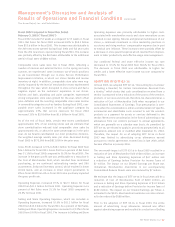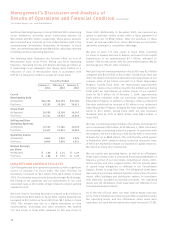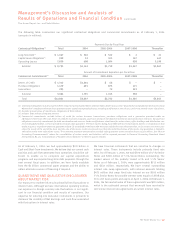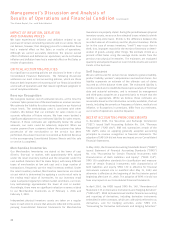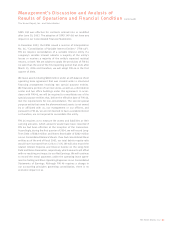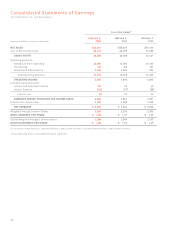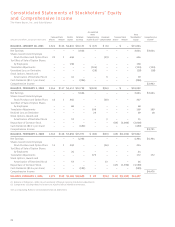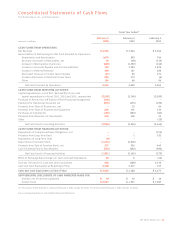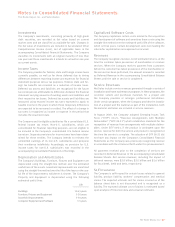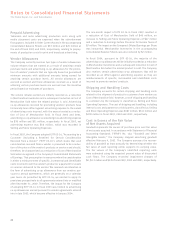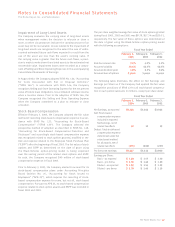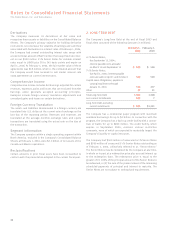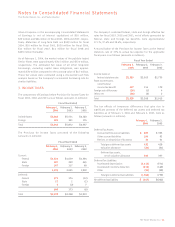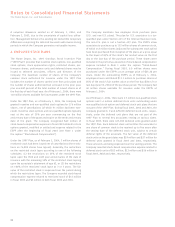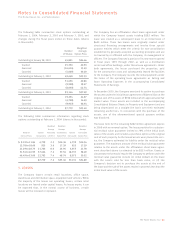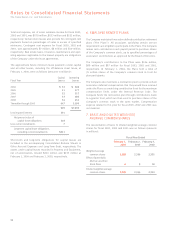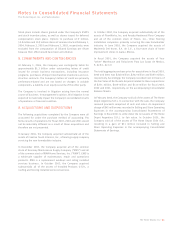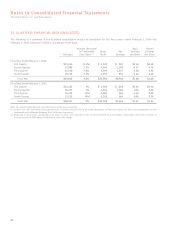Home Depot 2003 Annual Report Download - page 28
Download and view the complete annual report
Please find page 28 of the 2003 Home Depot annual report below. You can navigate through the pages in the report by either clicking on the pages listed below, or by using the keyword search tool below to find specific information within the annual report.1. SUMMARY OF SIGNIFICANT
ACCOUNTING POLICIES
Business, Consolidation and Presentation
The Home Depot, Inc. and subsidiaries (the “Company”) operate
Home Depot stores, which are full-service, warehouse-style
stores averaging approximately 107,000 square feet in size.
The stores stock approximately 40,000 to 50,000 different kinds
of building materials, home improvement supplies and lawn and
garden products that are sold primarily to do-it-yourselfers, but
also to home improvement contractors, tradespeople and
building maintenance professionals. In addition, the Company
operates EXPO Design Center stores, which offer products and
services primarily related to design and renovation projects,
Home Depot Landscape Supply stores, which service landscape
professionals and garden enthusiasts with lawn, landscape and
garden products and Home Depot Supply stores serving primarily
professional customers. The Company also operates The Home
Depot Floor Stores, which offer primarily flooring products and
installation services. At the end of fiscal 2003, the Company was
operating 1,707 stores in total, which included 1,515 Home Depot
stores, 54 EXPO Design Center stores, 11 Home Depot Landscape
Supply stores, five Home Depot Supply stores and two Home
Depot Floor Stores in the United States (“U.S.”); 102 Home Depot
stores in Canada and 18 Home Depot stores in Mexico.
The consolidated results include four wholly-owned subsidiaries
that operate under The Home Depot Supply brand. The four sub-
sidiaries are Apex Supply Company, Inc., Home Depot Your
“other” Warehouse LLC, Maintenance Warehouse/America Corp.
and HD Builder Solutions Group, Inc. The Company offers plumbing,
HVAC and other professional plumbing products through
wholesale plumbing distributors Apex Supply Company, Inc. and
Home Depot Your “other” Warehouse LLC. Maintenance
Warehouse/America Corp. supplies maintenance, repairs and
operations products serving primarily the multi-family housing
and lodging facilities management market. The Company
arranges for flooring, countertops and window treatment installa-
tion services to professional homebuilders through HD Builder
Solutions Group, Inc. The Consolidated Financial Statements
include the accounts of the Company and its wholly-owned
subsidiaries. All significant intercompany transactions have been
eliminated in consolidation.
Fiscal Year
The Company’s fiscal year is a 52 or 53-week period ending on
the Sunday nearest to January 31. Fiscal year ended February 1,
2004 (“fiscal 2003”) and fiscal year ended February 2, 2003
(“fiscal 2002”) include 52 weeks. Fiscal year ended February 3,
2002 (“fiscal 2001”) includes 53 weeks.
Use of Estimates
Management of the Company has made a number of estimates
and assumptions relating to the reporting of assets and liabilities,
the disclosure of contingent assets and liabilities, and reported
amounts of revenues and expenses in preparing these financial
statements in conformity with generally accepted accounting
principles. Actual results could differ from these estimates.
Fair Value of Financial Instruments
The carrying amount of Cash and Cash Equivalents, Receivables
and Accounts Payable approximate fair value due to the short-
term maturities of these financial instruments. The fair value of
the Company’s investments is discussed under the caption
“Investments” in this Note 1. The fair value of the Company’s debt
is discussed in Note 2.
Cash Equivalents
The Company considers all highly liquid investments purchased
with maturities of three months or less to be cash equivalents.
The Company’s Cash and Cash Equivalents are carried at fair
market value and consist primarily of high-grade commercial
paper, money market funds, U.S. government agency securities
and tax-exempt notes and bonds.
Accounts Receivable
The Company’s valuation reserve related to accounts receivable
was not material as of February 1, 2004 and February 2, 2003.
The Company also has an agreement with a third-party
service provider who manages the Company’s private label credit
card program and directly extends credit to customers.
Merchandise Inventories
The majority of the Company’s Merchandise Inventories are
stated at the lower of cost (first-in, first-out) or market, as
determined by the retail inventory method.
Certain subsidiaries and distribution centers record Merchandise
Inventories at lower of cost (first-in, first-out) or market,
as determined by the cost method. These Merchandise Inven-
tories represent approximately 7% of the total Merchandise
Inventories balance.
Independent physical inventory counts are taken on a regular
basis in each store to ensure that amounts reflected in the accom-
panying Consolidated Financial Statements for Merchandise
Inventories are properly stated. During the period between physical
inventory counts, the Company accrues for estimated losses
related to shrink on a store by store basis based on historical
shrink results and current trends in the business. Shrink is the dif-
ference between the recorded amount of inventory and the physical
inventory. Shrink (or in the case of excess inventory, “swell”) may
occur due to theft, loss, improper records for the receipt of inven-
tory or deterioration of goods, among other things.
Notes to Consolidated Financial Statements
The Home Depot, Inc. and Subsidiaries
26



